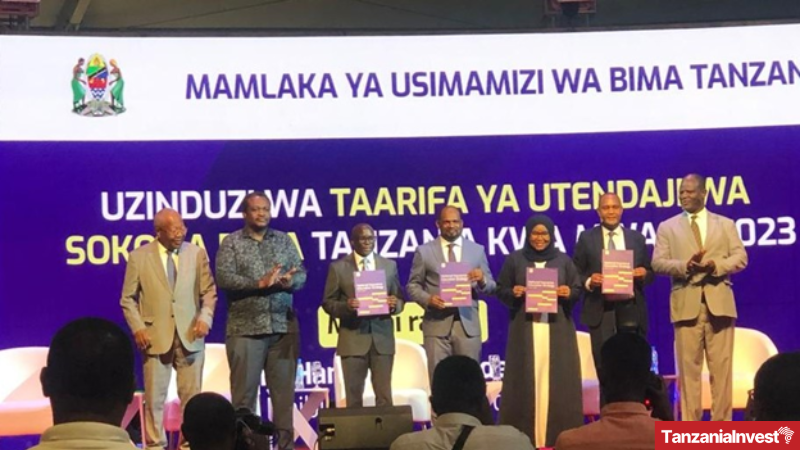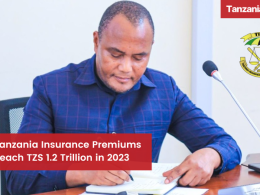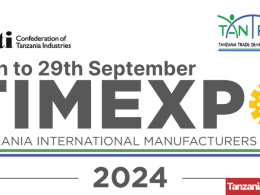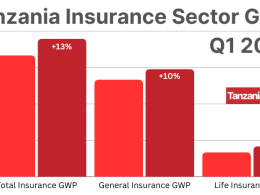Tanzania’s number of insurance service providers rose by 33%, from 1,165 in 2022 to 1,549 in 2023, contributing to a 34.1% increase in direct employment.
This announcement was made on 22nd November 2024 by the Commissioner of the Tanzania Insurance Regulatory Authority (TIRA), Dr. Baghayo Saqware during the launch of the 2023 Insurance Market Performance Report in Dar es Salaam.
The Report highlights several key growth trends and achievements within the sector.
The insurance premiums increased by 7.4%, rising from TZS 1.155 trillion in 2022 to TZS 1.24 trillion in 2023, continuing a five-year growth trajectory with an average annual increase of 13%, outpacing the country’s GDP growth.
The report also revealed a 30.4% increase in reinsurance capacity, which grew from TZS 201 billion in 2022 to TZS 262.5 billion in 2023, signaling improved market stability and a reduced dependency on foreign reinsurance.
Furthermore, asset growth in the sector soared by 26.8%, climbing from TZS 1.697 trillion to TZS 2.152 trillion, while investment assets rose by 9.3%, reaching TZS 1.278 trillion.
In addition, insurance claims payments grew by 25.5%, from TZS 389 million in 2022 to TZS 488 million in 2023, reflecting the sector’s strengthened ability to support policyholders during financial losses.
The report also noted an improvement in retention levels for general insurance, which rose by 12.3%, from 49.4% in 2022 to 55.6% in 2023.
On average, Tanzanians increased their spending on insurance by 4.4%, with an average of TZS 19,531 spent per person in 2023 from TZS 18,706 in 2022.
Finally, the report pointed to an expansion in employment within the insurance sector, with jobs increasing from 4,173 to 5,595, underscoring the sector’s growing impact on the Tanzanian economy.
Speaking at the launch Dr. Saqware highlighted: “Insurance is a solution to economic and social challenges, protecting assets, health, and investments […] “Insurance is not just a financial product—it is an economic enabler and a safety net for all Tanzanians.”
Dr. Saqware added that retaining premiums locally ensures a healthier national economy by minimizing outflows to international reinsurers.
He acknowledged challenges such as limited life insurance growth and litigation issues, which require robust legal and technological solutions, and emphasized that achieving a 15% annual growth rate is essential to meeting the government’s target of 5% insurance penetration by 2030.
During a panel discussion, Dr. Grace Magembe, the Deputy Permanent Secretary President’s Office, Regional Administration and Local Government (PO-RALG) in Tanzania, highlighted the importance of partnerships between local government and private insurers.
She stressed that collaboration with community workers and grassroots organizations would enable the insurance sector to penetrate rural areas.
Magembe emphasized that using innovative outreach strategies, such as leveraging local leaders and digital platforms, was crucial to educating the underserved population on the importance of insurance.
On his part, Harold Mashaka, representing private insurance companies, focused on the challenges and opportunities in extending coverage to informal sectors.
Dr. Mashaka called for increased investment in health insurance schemes and urged the sector to explore technology-driven solutions to reduce costs and improve service delivery.
Dr. Edina Makwabe, from the Private Hospitals Association of Tanzania, discussed the integration of private health services into the Universal Health Insurance framework.
She pointed out that aligning standards and improving compliance across private and public health facilities was critical to achieving universal coverage.
Dr. Makwabe highlighted the potential for telemedicine to revolutionize access to health insurance, especially in remote areas, and called for stronger public-private partnerships.
The Chief Secretary of Zanzibar, Hon. Zena Ahmed highlighted Zanzibar’s commitment to strengthening insurance regulation and encouraging investments in the sector.
She stressed the need for Islamic insurance (Takaful) to cater to a broader segment of the population and align with the cultural and religious practices in Zanzibar.
Hon. Zena called for efforts to attract foreign investments into the sector, emphasizing that insurance can drive economic stability and resilience across the archipelago.
In his closing remarks, Tanzania’s Deputy Minister of Finance Hon. Hamad Chande, reaffirmed the government’s support for the insurance sector.
He noted that insurance is vital to achieving the goals outlined in Tanzania’s Development Vision 2030.
Hon. Chande praised TIRA for its performance in regulating and promoting the sector and called on all stakeholders to work collaboratively towards achieving the insurance penetration target.










